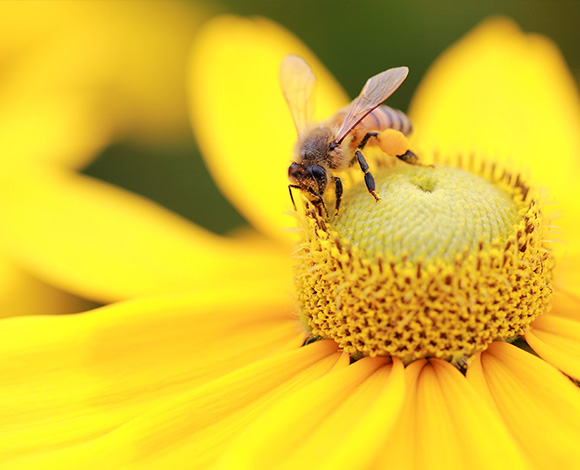蜜蜂麻煩大了
Honey Bees in Trouble
- 出題日期
- 2018/11/10、2017/3/18
- 命中課本
- 菁英雅思機經「動物學,植物學與昆蟲學」
- 延伸閱讀
- 劍雅 12-4-2 Bring Back the Big Cats
- 中文說明
 距今十年前,大批蜂巢內的工蜂突然消失,歐洲蜜蜂蜂群大量死亡,造成蜜蜂生態崩解,美國於 2006 年末首次將這個現象命名為 CCD「蜂群崩壞症候群」(colony collapse disorder)。沒有了蜜蜂,農田將會貧瘠,經濟體系將面臨崩潰,糧食將大量縮減。蜜蜂在當今現代化的農業中,已不是天然物種,而授粉這件事,如今也成為專門用來生產製造的工業。在美國,有將近三百萬個蜂巢是用來從事授粉工業,美國的農夫也開始使用大量的有機磷酸酯殺蟲劑,大規模耕種單一作物,實行「淨田」措施,在農田的邊緣、路邊清除天然生長的植物。但這些做法將徹底消滅大自然原生的蜜蜂...
距今十年前,大批蜂巢內的工蜂突然消失,歐洲蜜蜂蜂群大量死亡,造成蜜蜂生態崩解,美國於 2006 年末首次將這個現象命名為 CCD「蜂群崩壞症候群」(colony collapse disorder)。沒有了蜜蜂,農田將會貧瘠,經濟體系將面臨崩潰,糧食將大量縮減。蜜蜂在當今現代化的農業中,已不是天然物種,而授粉這件事,如今也成為專門用來生產製造的工業。在美國,有將近三百萬個蜂巢是用來從事授粉工業,美國的農夫也開始使用大量的有機磷酸酯殺蟲劑,大規模耕種單一作物,實行「淨田」措施,在農田的邊緣、路邊清除天然生長的植物。但這些做法將徹底消滅大自然原生的蜜蜂...- 高分單字
-
pollinator n. (花粉)傳粉媒介,傳粉昆蟲
In the natural world, bees are the best pollinators.
ailment n. 病痛;(尤指輕微的)疾病
蜜蜂是自然界最好的授粉者。You can treat the minor ailments yourself.
sterile adj. 貧瘠
你自己可以治療這個輕微的病痛。This farmland is too poor in quality to produce crops.
scarce adj. 極為稀少的
這塊農田太過貧瘠,以至於無法耕作。In this country, food was often scarce in the winter.
alchemy n. (將事物變得更好的)神奇力量
糧食在這個國家的冬季通常變得非常稀少。By some extraordinary alchemy, he turned the ordinary ingredients into the delicious dishes.
hive n. 蜂巢
像用了魔法似的,他把普通的食材變成美味的菜餚。A hive is a small box where bees are kept.
organophosphate n. 有機磷酸酯
蜂巢就是蜜蜂停留聚集、像一個小盒子的地方。An organophosphate is a chemical used for killing insects that damage crops.
monoculture n. 單一栽培
有機磷酸酯是一種化學物質,用來消滅損害農作物的昆蟲。Farmers had to use massive amounts of chemical pesticides for such vast areas of monoculture.
vulnerable adj. 易受傷的
為了如此大範圍的單一作物,農夫不得不使用大量的化學殺蟲劑。Native bees are as vulnerable to insecticides as any agricultural pest.
inhospitable adj. 難以居住的,條件惡劣的
自然生長的蜜蜂和任何農作物的害蟲一樣,容易被殺蟲劑傷害。The field researchers had to trek for miles through inhospitable countryside.
這些田野調查員不得不在條件惡劣的鄉野艱苦跋涉數英里。 - 看出題原文
-
Honey Bees in Trouble
Can native pollinators fill the gap?
Recently, ominous headlines have described a mysterious ailment, colony collapse disorder(CCD), which is wiping out the honeybees that pollinate many crops. Without honeybees, the story goes, fields will be sterile, economies will collapse, and food will be scarce.
But what few accounts acknowledged is that what’s at risk is not itself a natural state of affairs. For one thing, in the United States, where CCD was first reported and has had its greatest impacts, honeybees are not a native species. Pollination in modern agriculture isn’t alchemy. It’s industry. The total number of hives involved in the U.S. pollination industry has been somewhere between 2.5 million and 3 million in recent years. Meanwhile, American farmers began using large quantities of organophosphate insecticides, planted large-scale crop monocultures, and adopted “clean farming” practices that scrubbed native vegetation from field margins and roadsides. These practices killed many native bees outright—they’re as vulnerable to insecticides as any agricultural pest—and made the agricultural landscape inhospitable to those that remained. Concern about these practices and their effects on pollinators isn’t new, in her 1962 ecological alarm cry Silent Spring, Rachel Carson warned of a ‘Fruitless Fall’ that could result from the disappearance of insect pollinators.
If that “Fruitless Fall”, has not—yet—occurred, it may be largely thanks to the honeybee, which farmers turned to as the ability of wild pollinators to service crops declined. The honeybee has been semi-domesticated since the time of the ancient Egyptians, but it wasn’t just familiarity that determined this choice: the bees’ biology is in many ways suited to the kind of agricultural system that was emerging. For example, honeybee hives can be closed up and moved out of the way when pesticides are applied to a field. The bees are generalist pollinators, so they can be used to pollinate many different crops. And although they are not the most efficient pollinator of every crop, honeybees have strength in numbers, with 20,000 to 100,000 bees living in a single hive. “Without a doubt, if there was one bee you wanted for agriculture, it would be the honeybee, “says Jim Cane, of the U.S. Department of Agriculture. The honeybee, in other words, has become a crucial cog in the modern system of industrial agriculture. That system delivers more food, and more kinds of it, to more places, more cheaply than ever before. But that system is also vulnerable, because making a farm field into the photosynthetic equivalent of a factory floor, and pollination into a series of continent-long assembly lines, also leaches out some of the resilience characteristic of natural ecosystems.
完整文章內容,請參閱菁英機經教材課本。
只要相信改變的力量,勇敢去改變,未來會有無限可能
相信自己!相信菁英!陪你勇敢踏出挑戰自己的第一步,創造屬於你的可能性!
線上預約諮詢
留下您的學習想法!
我們將於24小時內與您聯繫,共同規劃學習藍圖。
撥打電話聯繫
別讓前進的動力消失!立即與專員一對一討論學習計畫。
線上即時諮詢
不想等待嗎?!可與菁英專業顧問即時線上詢問;
線上諮詢服務時間:上午10:00至晚上20:00。


